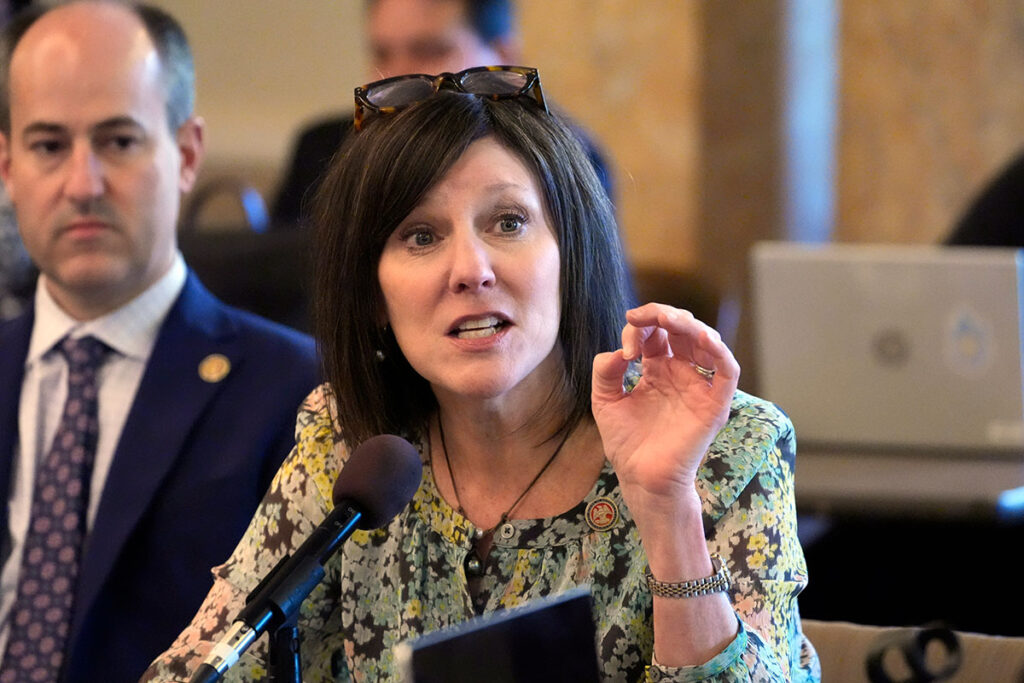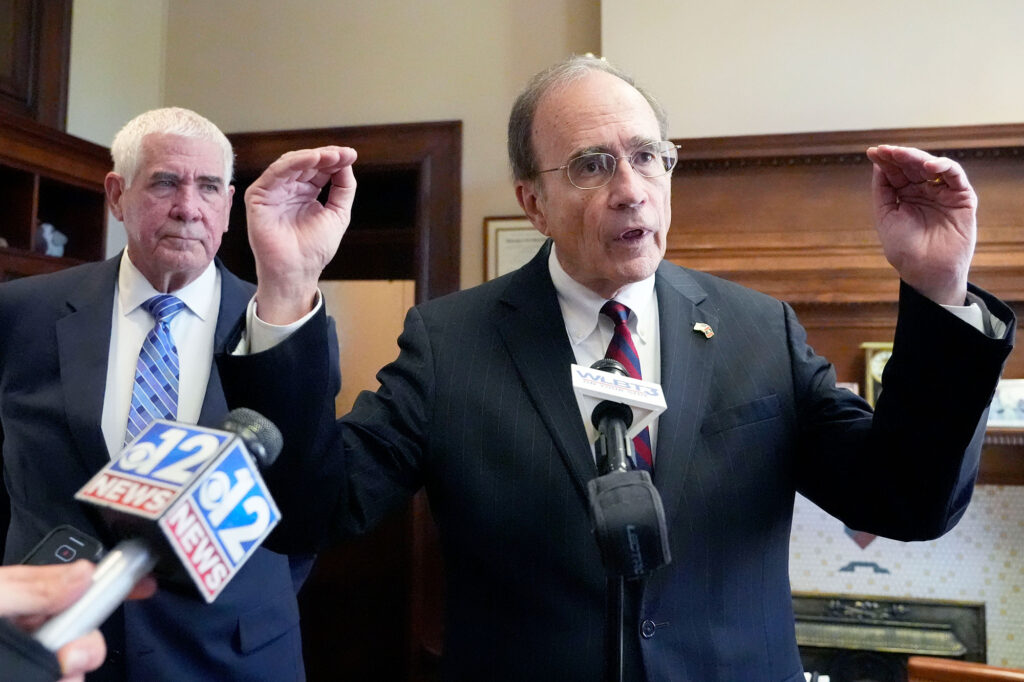The fate of health care for thousands of Mississippians could depend on former President Donald Trump winning November’s presidential election despite dozens of felony charges under a Medicaid expansion compromise proposal that state senators offered on Friday morning.
That’s because the Senate plan, unlike the Medicaid-expansion plan the House passed in February, tethers the fate of Medicaid expansion to whether or not the federal government approves work requirements—a policy President Joe Biden’s administration has blocked in other states but which the Trump administration previously approved with waivers.
“Based upon the timing of all this, we may have a different president, and I believe work requirements won’t be an issue,” Senate Medicaid Committee Chairman Sen. Kevin Blackwell, R-Southaven, told the Mississippi Free Press on Friday.
Like the chamber’s original plan, the Senate’s compromise proposal still requires the U.S. Medicare and Medicaid Services to approve a requirement for anyone receiving expanded Medicaid to work at least 120 hours per month. The Senate compromise plan would direct Attorney General Lynn Fitch to appeal the issue in federal courts if CMS denies a work requirement waiver, but a court battle could delay implementation of Medicaid expansion for years.
Trump is currently facing 88 felony criminal indictments across four jurisdictions, including state charges in New York and Georgia and federal charges in Florida and Washington, D.C. The ex-president is currently on trial in New York over hush-money payments made during the 2016 election while a federal trial in the nation’s capital over his plot to overthrow the 2020 election awaits a U.S. Supreme Court ruling on his claims of presidential immunity from prosecution.

Though the indicted 2024 Republican candidate’s administration previously approved work requirements for Medicaid expansion, he has long campaigned on repealing former President Barack Obama’s 2010 Patient Protection and Affordable Care Act—the federal law that makes Medicaid expansion possible. When he was in office in 2017, the Republican-led U.S. Senate narrowly failed to repeal the ACA thanks to a no-vote from former Republican U.S. Sen. John McCain of Arizona.
In January 2024, Trump reiterated his determination to repeal and replace “Obamacare” if he wins the election. Last month, though, he suddenly shifted his stated public position in a social media post. “I’m not running to terminate the ACA, AS CROOKED JOE BUDEN DISINFORMATES AND MISINFORMATES ALL THE TIME,” he claimed in a post on his social network, Truth Social, on March 26.
Hosemann: Work Requirement ‘Non-Negotiable’
The Mississippi House’s original plan included a work requirement of 20 hours a week but House Medicaid Committee Chairman Rep. Missy McGee, R-Hattiesburg, has repeatedly said Medicaid expansion would still become law under the House bill even if CMS denied a waiver.
“There are a lot of reasons why that low percentage of the population may not be able to work at the moment, anyway. But we do believe that this is a program for working Mississippians,” McGee said in an April 23 Medicaid expansion conference meeting with House and Senate conferees, including Blackwell. “In our bill, we have a work requirement in the first section. But we are not willing to hold back 80% of the hard-working Mississippians because we fear that maybe a small percentage somehow may gain the system.”
But in a statement Friday morning, Lt. Gov. Delbert Hosemann’s office said a work requirement “is a non-negotiable element” for any Medicaid expansion plain in his chamber.
“We are hopeful a compromise is on the horizon. When people are healthy, they are working, raising their families, and contributing to their communities,” the Republican Senate president said. “Access to healthcare is a critical component of economic and workforce development efforts in Mississippi—and reforming healthcare is the right thing to do.”
Coming to a Compromise
The plan the House passed in February would have provided full Medicaid coverage under the Affordable Care Act for people making up to 138% of the federal poverty line. The House estimated that up to 200,000 people would have gained coverage under that proposal. The Senate’s original proposal would only have covered people making up to 100% of the federal poverty level, meanwhile, and Sen. Kevin Blackwell previously estimated that it would only have covered between 40,000 to 80,000 people.
Like the original House proposal, the Senate’s proposed compromise plan would increase the threshold for Medicaid expansion to include those making up to 138% of the federal poverty level, meaning $20,120 for an individual and $43,056 for a family of four. The main difference would be that the Senate would keep its requirement for the federal government to approve work requirements in order for anyone to get coverage under expansion.
House and Senate Medicaid expansion conferees met on Tuesday, April 23, to discuss their competing expansion plans and to negotiate a compromise. On Thursday, April 25, the House gathered to have a second joint conference with the Senate, but senators did not show up to the meeting.
“I told the madam chairman that I was going to work on getting a proposal to 138%, and I would not be meeting again. She went ahead and scheduled the meeting anyway, and I was in another meeting,” Blackwell told the Mississippi Free Press, referring to Rep. Missy McGee.

He delivered the Senate’s compromise proposal to the House on Friday morning.
If Mississippi expands Medicaid coverage to include people making up to 138% of the federal poverty level, Rep. Missy McGee noted that Mississippi would receive about $650-700 million in federal funds in the first two years of the program that the State would have had to give up under the Senate’s earlier 100% plan. The money would fund the program for four years, she said in Tuesday’s joint meeting
“So, basically we viewed it almost like a pilot program that the federal government would pay for,” she said of the House’s expansion plan.
Blackwell said the Senate’s plan would put those additional funds in a separate account to “further fund the plan as we go through over the years.”
If the House accepted the Senate’s Medicaid expansion compromise proposal and it became law, the federal government would fund 90% of the program and the state would pay for the remaining 10%. Under the original Senate plan, the federal government would have only provided a 77% match. The House’s plan guarantees a 90% match as well, along with a two-year 5% increase under pandemic relief spending.
The Mississippi Division of Medicaid would have to apply for a waiver to get a managed care organization to cover people making less than 100% of the federal poverty level under both of the Senate’s plans.
“The difference in our proposal is (for) the people from 0 to 100 (percent of the federal poverty level) who have nothing, and that’s the coverage gap that everybody talks about,” Blackwell said. “And that was the folks that we’re wanting to help in the Senate’s original plan.”
Gov. Reeves Still Opposes Expansion
Earlier in the legislative session, Republican Gov. Tate Reeves reiterated his longtime opposition to Medicaid expansion and threatened to veto any expansion proposal that reaches his desk.
“I will continue to do what I told the voters I would do—fight Obamacare Medicaid Expansion with every ounce of my being!” he tweeted on March 27.

If the governor vetoes expansion, the House and Senate could override his veto with a two-thirds majority vote in both chambers.
Both the House and Senate passed their original versions of Medicaid expansion with more than two-thirds of members in favor, with a 99-20 vote in the House on Feb. 28 and a 36-16 vote in the Senate on March 28.










